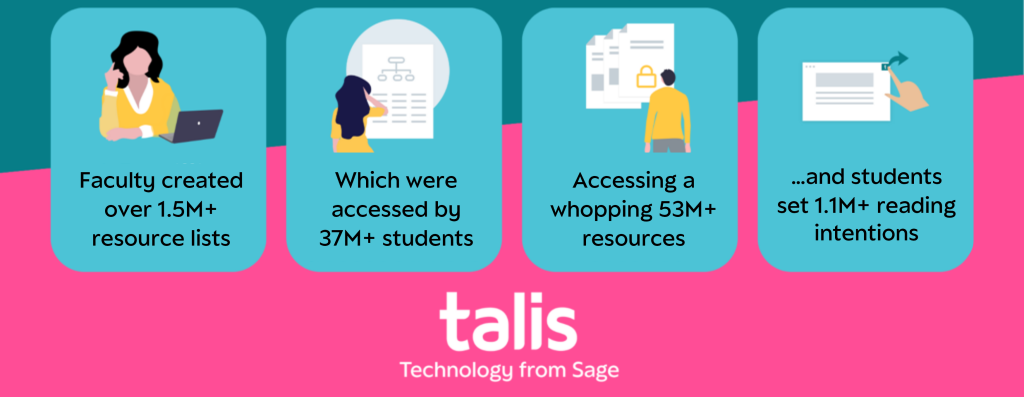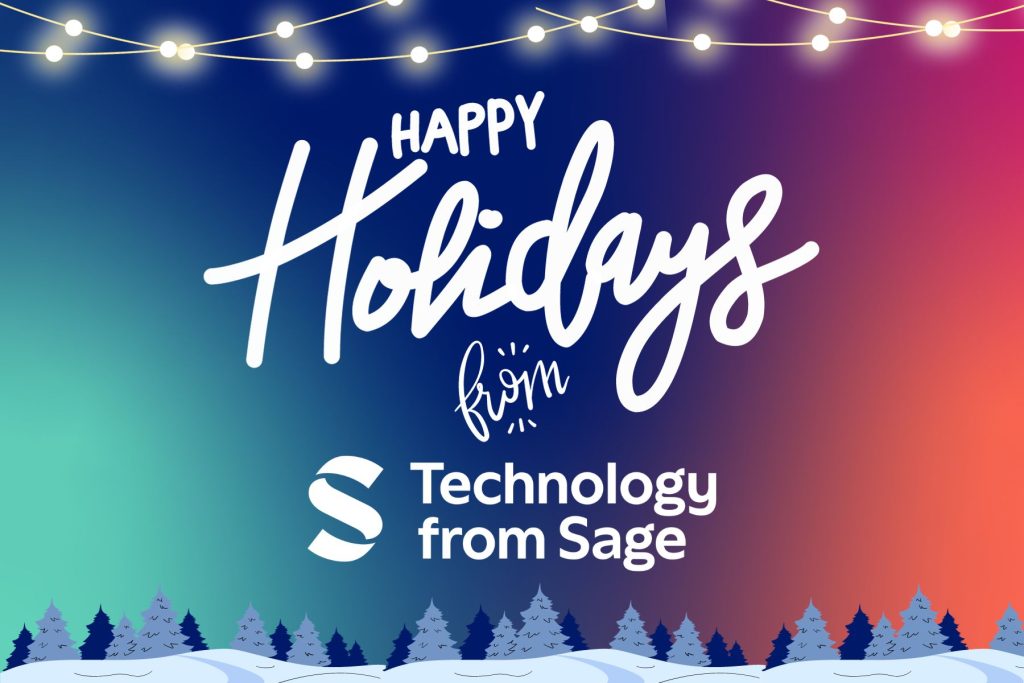As we bid farewell to 2023, we took the opportunity to reflect on how the Talis Aspire resource list management system connected libraries with faculty and students this year via their course lists. Read on for a round-up of how Talis Aspire supported student reading this year, new developments to the platform, new university partners we welcomed, and what to expect from Talis Aspire in 2024.
Supported (a lot of!) student reading in 2023
Faculty and other list creators at institutions created over 1.5 million resource lists on Talis Aspire in 2023 alone – that’s a lot of reading! These lists were accessed by over 37 million students, connecting them with over 53 million learning resources. Furthermore, students set 1.1 million reading intentions on the Talis Aspire platforms, helping hone their academic reading and study skills.
Talis Aspire continues to be a preferred resource list management for libraries not just in the UK but around the world. It works flexibly with all major library management systems (including ExLibris Alma, OCLC WMS , EBSCO FOLIO, Koha and more) to embed the library in the heart of teaching and learning. In addition to our 100 strong customer base, we welcomed new universities to the Talis Aspire community in 2023, including Loughborough University, University of North Alabama, Douglas College and University of Kentucky.

Perfected pedagogy: Top Talis Aspire resource lists from 2023
Curating a pedagogically robust course resource list makes all the difference to both student enjoyment and success. However, curating resource lists for modules, courses, extra curricular training or more takes huge amount of knowledge and expertise. The Talis Aspire community chose some of the best resource lists created on Talis Aspire this year, based on their use of structure, signposting, diversity of resources, and more. Browse the list below for just a taster of how Talis Aspire helps teachers do their best work:
- Advanced Copyright and Design Law from University of Nottingham: This list extensively uses annotation and guided questions at the start of each section, in addition to mixture of online and offline resources.
- Video resources for anthropology from Oxford Brookes University: We love this list’s extensive use of video content to engage both students and staff, with geographical organisation and a mixture of online and offline resources.
- Indigenous Justice Issues from University of Tasmania: This list demonstrates excellent organisation of resources by level of importance and highlighting if a content is required or recommended.
- Organising for the Future of Work from Auckland University of Technology: We love its excellent use of organisation, arrangement of content by topics and providing guidance to students via the use of headings and subheadings.
- How to use Talis Aspire – guides and help for academic staff from Oxford Brookes University: This structured reading list methodically explains how to get the most of Talis Aspire for academic staff. A list about Talis Aspire created on Talis Aspire; how meta!
- International Refugee Law (Term 2) from Warwick University: We love this list’s great structure, the extensive use of free annotation to provide context and talking points for students.
- #GetALife – Biographies and Autobiographies from Oxford Brookes University: This list provides clear organisation of content by discipline and uses both physical and digital resources.
- Anti-Racism Resources from University of Waikato: We love this list’s use of categorization, providing an excellent introduction to the topic, with content targeted at specific audiences depending on their needs. Additionally, it makes great use of video and audio content, online articles, print books and content from its library holding, saving faculty and students time and money.
- SEC Inclusive Reading from University of West London: This library-created list uses annotation extensively, with a summary of the content of each resource available, noting the relevance for its inclusion on the list and streamlining inclusion of lecturers’ own resources on lists.
Stepped up the system: New developments to Talis Aspire in 2023
Demands on the library are increasing and evolving. We recognized that Talis Aspire must too evolve to best support librarians, so we stepped up product development with a brand new product team and increased resource in 2023. Below is an overview of three exciting areas of development to the Talis Aspire platform in 2023:
Integrated with major library discovery providers: Call us ‘ILS-agnostic’!
Talis Aspire launched new integrations with library discovery services Primo, WorldCat and ESBCO Discovery Service (EDS), followed by Summon. These integrations enables users to search for resources via your library discovery system (i.e. your library’s existing internal holdings, licenses and subscriptions), directly within Talis Aspire. The flexibility of Talis Aspire being ILS-agnostic with its integrations means that, no matter which discovery system the library uses:
- Faculty don’t have to switch between Talis Aspire and your discovery system, streamlining their workflow and saving time
- Faculty are able to easily browse your library resources and holdings when creating their resource lists, ultimately driving usage and maximizing value of library holdings
- Faculty are prompted to use library-owned resources rather than other, paywalled resources, saving both students and the library money.
Customer feedback informed development: You said, we listened, and then we did…
We undertook an intense customer listening exercise and grouped customer feedback from the last few years into key themes to build into the Talis Aspire product roadmap. The themes included list editing, reviews, self-service, analytics & reporting, and customization. This exercise meant we developed faster, more aligned to library needs and had some very happy customers! Watch the webinar recording below to hear Scott Gibbens, Head of Product for Talis, cover what we learned from the customer feedback exercise and what was delivered earlier in 2023.
Plus all our other developments: Improved, enhanced and introduced
In addition to the new integrations and feedback themed release, we also sped up and increased continuous improvement development to Talis Aspire. Below we highlight just a few of the cool, new features, enhancements and improvements to user experience:
- Easier bookmarking of resources: There were a vast array of improvements and new features to make bookmarking resources even smoother for faculty. This includes launching a Safari bookmarking extension to join the current Chrome, Edge and Firefox extensions, enhancements on a bunch of websites and repositories, a new guide on installing the bookmark extension and more.
- More info & meta data (for both resources and book suppliers): Talis Aspire improved how resource metadata is displayed when adding a resource to a list, making it easier for faculty to identify the correct resources. Additionally, improvements were made to the book supplier information provided in Talis Aspire for faculty and students.
- Notes and commenting functionality to simplify life for librarians: Note-taking and commenting features were added to various areas in Talis Aspire to improves the process of reviewing lists, digitization requests and CSV exports and reports for librarian users.
Find out more in 2024…
Thank you to all our partner universities and congratulations on achieving these wonderful results on Talis Aspire. More exciting improvements and developments are planned for Talis Aspire next year, including improved reviews and acquisitions workflows and enhanced integrations to better streamline how librarians make acquisitions from Talis Aspire.
If your library does not yet use Talis Aspire but is looking to implement a new resource list management system, or wants to see how Talis Aspire compares to your library’s current resource list manager, get in touch:





